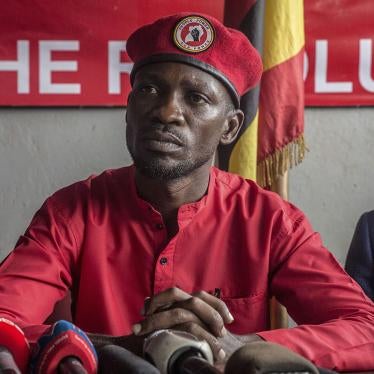As a top British minister prepares to travel to Bahrain, Human Rights Watch urged that the disturbing human rights situation in that country be on the agenda of all high level meetings with Bahraini officials.
Human rights conditions in Bahrain have seriously deteriorated since the current political unrest began in late 1994. Violations include arbitrary detention, torture, deaths in custody, unfair trials, and restrictions on freedom of expression and association. At least seven persons have died in detention or shortly after their release since the unrest began. The latest victim, Nuh Khalil `Abdallah Nuh, twenty-three, died two days after his arrest on July 19.
Human Rights Watch called on Bahrain to appoint an independent procecutor to investigate allegations of torture and deaths in custody, and to take steps to guarantee freedom of expression and association.
Bahrain announced last month that it would allow a visit by the U.N. Working Group on Arbitrary Detention, and reconsider its reservation to Article 20 of the Convention against Torture -- thereby allowing the Committee against Torture to conduct confidential investigations into allegations of torture in Bahrain.
"We applaud the government’s recognition that torture and arbitrary detention are a problem in Bahrain," said Hanny Megally, executive director of Human Rights Watch’s Middle East and North Africa division. "But Bahraini citizens shouldn’t have to die before the government is willing to act." Megally urged Bahrain to quickly make its declaration in favor of Article 20, and to set a date for a Working Group visit.
Megally was also critical of steps Bahrain has taken this year to increase already severe restrictions on the right to freedom of association, and in particular to stifle the activities of the Bahraini Lawyers’ Society.
"The Lawyers’ Society was perhaps the last place in Bahrain where people could come together to talk about the problems facing that country," Megally said. "If Bahrain’s lawyers are intimidated into silence, what hope is there for ordinary citizens to speak their minds?"
Fatchett’s visit comes only days before a September 16 court hearing on the appeal of the elected board of the Lawyers Society against their forced replacement by government supporters.
Details on deaths in detention, actions taken against the Lawyers’ Society, and Human Rights Watch’s recommendations to the Bahraini government are summarized below.
Deaths in Custody
Human Rights Watch has received reports of at least seven deaths due to the torture, mistreatment or medical neglect of detainees in Bahrain since the unrest began in December 1994.
The most recent victim, Nuh Khalil `Abdallah Nuh, twenty-three, was reported to be in good health when he was detained in the al-Na`im district of Manama by members of Bahrain’s security forces on July 19, 1998. When his body was returned to his family on July 21, it reportedly bore marks indicating Mr. Nuh had been tortured while in custody.
Other recent cases include Sheikh `Ali al-Nachas, a blind Shi'a cleric about fifty years old, who died on June 29, 1997 in al-Qal`a Prison in Manama, where he had been held incommunicado since his arrest on April 23, 1997; `Abd al-Zahra Ibrahim `Abdullah, twenty-seven, who died on June 6, 1997, five days after his arrest during clashes with security forces in the village of Sanabis; and Bashir Abdallah Ahmad Fadhil, whose body was returned to his family for burial on May 18, 1997, two days after his arrest during an assault by security forces in the village of Daih. Eyewitnesses to the arrests of `Abdullah and Fadhil reported that both men were beaten at the time of their arrests.
Tightening restrictions on freedom of association: the Lawyers’ Society
Despite the guarantee of freedom of association in Bahrain’s constitution, Legislative Decree 21 of 1989 includes a broadly-worded provision, Article 18, which prohibits organizations from engaging in politics, in violation of the internationally recognized right of persons to engage in peaceful political activity and participate in public affairs.
The Lawyers’ Society until recently appeared to be exempt from this blanket prohibition, and regularly held "internal events," to which it invited non-lawyers. In late January 1998, the society sponsored a meeting on "The Tehran Conference, The Doha Conference, and Their Repercussions for the Region." After the meeting security forces reportedly interrogated the society’s staff about who attended and spoke, and the ministers of justice and interior separately questioned Lawyers’ Society president Abbas Hilal about the meeting.
On February 28, Minister of Labor and Social Affairs `Abd al-Nabi al-Shu`ala dismissed the society’s elected administrative board and canceled a general assembly meeting scheduled for March 19, at which new elections were to be held. That same day the minister issued Decree 4 of 1998, charging the society with being in violation of Article 18 of Decree 21/1989, and appointing a new board charged with presenting recommendations for reforming the society. The decree provided for an automatic one-year extension of the term of the appointed board if new elections are not held within its first eleven months.
More than seventy members of the society filed a legal challenge to the government’s action, which will be heard on September 16 before a special court headed by Sheikh Khalifa bin Rashid Al Khalifa, the head of the State Security Court. The minister of labor has reportedly met with lawyers leading the court challenge to press them to drop the appeal, to agree to seek permission for all society activities, including internal meetings, three months in advance, and to refrain from any participation in politics. The lawyers were also instructed to remain silent about these meetings.
Despite repeated requests by Human Rights Watch, Bahraini government has yet to make public any evidence to substantiate the charge that the Lawyers’ Society is in violation of Decree 21/89 or any other laws or decrees governing its activities, or to clarify what activities it considered to be serious enough breaches of the law as to require the removal of the elected board less than three weeks before already scheduled general elections.
Recommendations
In light of the worsening situation with respect to freedom of association and continued reports of deaths in custody, torture, and mistreatment of detainees, Human Rights Watch calls on the government of Bahrain to take the following steps:
Appoint an independent prosecutor to investigate deaths alleged to have occurred at the hands of the security forces, as well as acts of torture and cruel, inhuman and degrading treatment alleged to have been committed by officers of the Special Investigation Service, the Criminal Investigation Directorate, and the Public Security Force. Such a prosecutor should be empowered to report publicly on the findings of the investigation, and to bring charges against any officials implicated as responsible for ordering, carrying out, or tolerating acts of torture or acts resulting in wrongful death.
Amend those laws and decrees that unduly restrict the ability of citizens to exercise the right to free speech and to freedom of association, such as Article 18 of Legislative Decree 21/1989, to bring them into compliance with international human rights standards.
Immediately halt all efforts to undermine the Lawyers’ Society, or to interfere with its conducting its legitimate activities as a legal professional association







